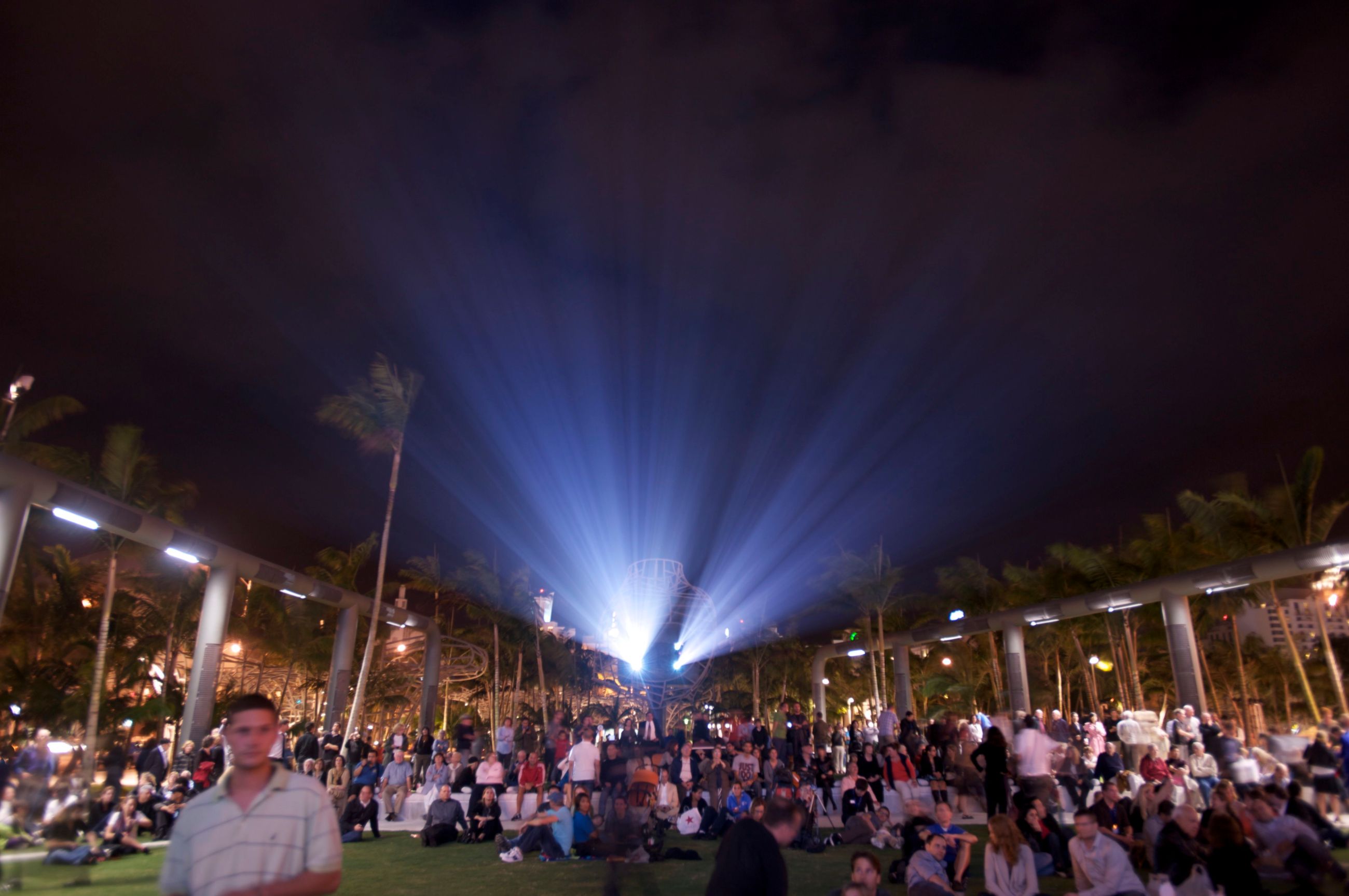
Poetry hits the big screen with O, Miami Wallcast this week
Photo credit: City of Miami Beach
Knight Foundation is founding sponsor of O, Miami, which seeks to enable every person in Miami-Dade County to encounter a poem during the month of April. Below, P. Scott Cunningham, founder and executive director of O, Miami, writes about the poetry festival, which includes an event each day in April and 25 poetry-in-public places projects.
This Saturday, April 5, O, Miami is putting poetry on the side of the New World Center in Miami Beach.
HERE
Nothing has changed. They have a welcome sign a hill with cows and a white house on top, a mall and grocery store where people shop, a diner where some people go to dine. It is the same no matter where you go, and downtown you will find no big surprises. Each fall the dew point falls until it rises. White snow, green buds, green lawn, red leaves, white snow.
This is all right. This is their hope. And yet, though what you see is never what you get, it does feel somehow changed from what it was. Is it the people? Houses? Fields? The weather? Is it the streets? Is it these things together? Nothing here ever changes, till it does.
Source: Poetry (February 2010).
If you’ve ever been to one of the free movies in SoundScape Park or one of the concert Wallcasts, then you understand the experience. People bring blankets, chairs and picnic baskets to the park and watch the 7,000-square-foot screen and hear everything in surround sound. Combined with the beauty of SoundScape Park, the Wallcasts are one of the most unique urban experiences in America.
O, Miami joined forces with New World Symphony and the city of Miami Beach to create a poetic experience on the wall, and Poetry in the Park is the result.
The evening begins at 5 p.m. Three separate stages will host performances by musicians and poets, including members of the New World Symphony “house band” Somewhat Hungover, New World Symphony fellows, “Biscayne Poet” Oscar Fuentes, and members of the Miami Poetry Collective doing one of their famous pop-up “Poem Depots.”
Miami food favorites such as La Latina, My Ceviche and Feverish Pops will have food for sale and KIND Bar will set up one of their “Flower Walls,” while giving away KIND snacks with poems attached to them.
For those who love used books, Bookleggers Mobile Library will set up a book exchange. Bring a book to trade and browse their selection of rare and out-of-print titles. And for those with children—or those of you who just like to play)—we’ll have four giant sets of Bananagram games test your word skills.
At 8 p.m., lay out your blanket or pop open your chair for the poetry on the wall from two of our nation’s most notable poets.
Nikky Finney won the 2011 National Book Award for her collection, “Head Off & Split,” which was partially inspired by her childhood in South Carolina during the civil rights movement. “I know the sound of the ’60s and ’70s,” she told The Lexington Herald-Leader after being named a finalist. “There was a lot of standing with signs, there was a lot of shouting. I wanted to be a poet who didn’t shout, who said things but said them with the most beautiful attention to language.”
I saw Finney read at The Dodge Poetry Festival in Newark, N.J., in 2012, and she is one of the most commanding presences in contemporary poetry. Her voice, despite rarely rising above a low, conversational tone, had an audience full of teenagers dead silent and hanging on her every word.
Former U.S. Poet Laureate Robert Hass, one of the five most important living poets in America, will follow Finney.
His first book, “Field Guide” (1973) won the prestigious Yale Series of Younger Poets prize, and his 2007 collection, “Time and Materials,” won both the Pulitzer Prize and the National Book Award. His best book may be the iconic collection “Human Wishes” (1989), in which Hass experimented with longer lines, prose poems, and a haunting sense of narrative.
Hass is also the best English-language translator of traditional Japanese haiku. His versions of the form’s masters—Matsuo Basho, Yosa Buson and Kobayashi Issa—rupture the syllabic format to capture the imagery of the originals, while also creating the feeling of “swiftness” that was so important to the authors. Here’s his rendition of one of Basho’s most famous haiku:
I go,
you stay;
two autumns.
Here’s my haiku about the event, which is free. (Warning: It’s no Robert Hass.)
You come,
We project;
two poets.
For more information and a complete schedule of events for O, Miami, visit omiami.org.
Recent Content
-
Artsarticle ·
-
Artsarticle ·
-
Artsarticle ·

